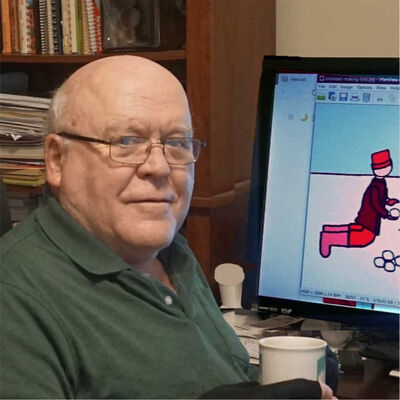Solar Eclipse
Feb 20, 2024 02:10:08 #
Looking for some recommendations for taking pictures of the solar Eclipse.
I am thinking I will have 3 cameras going. Two dslr, both canon and my Google pixel 7 pro.
One to take a video
One to take stills say every 30 seconds, time lapsed
And possible hook the pixel to an old hand made telescope made by my father and brother some 50 years ago. It Has a 6 inch mirror and some wildly good optics with many many times more powerful that a zoom lens. Problem is there is no way to use those optics with a camera so I attach a phone holder to the focus ring adjust the focus with a choice of optics and then rotate the phone lense over the optics. It's not pretty but it works.
So here is my question s..1) For the video what mm lens would you recommend? More of a wide angle, middle of the road or telephoto?
2) for the stills how big do I need? Greater than 300mm? What intervals would use suggest between shots?
3) for those that have experience, it wise to try and remove ND100k filters while it is totally dark for a photo? I will be in the Cleveland area schedule for about 3 minutes of darkness.
4) and other suggestions is ways to use the. Telescope?
Would really really appreciate any answers, suggestions recommendations!!!
Thank you in advance!
John
I am thinking I will have 3 cameras going. Two dslr, both canon and my Google pixel 7 pro.
One to take a video
One to take stills say every 30 seconds, time lapsed
And possible hook the pixel to an old hand made telescope made by my father and brother some 50 years ago. It Has a 6 inch mirror and some wildly good optics with many many times more powerful that a zoom lens. Problem is there is no way to use those optics with a camera so I attach a phone holder to the focus ring adjust the focus with a choice of optics and then rotate the phone lense over the optics. It's not pretty but it works.
So here is my question s..1) For the video what mm lens would you recommend? More of a wide angle, middle of the road or telephoto?
2) for the stills how big do I need? Greater than 300mm? What intervals would use suggest between shots?
3) for those that have experience, it wise to try and remove ND100k filters while it is totally dark for a photo? I will be in the Cleveland area schedule for about 3 minutes of darkness.
4) and other suggestions is ways to use the. Telescope?
Would really really appreciate any answers, suggestions recommendations!!!
Thank you in advance!
John
Feb 20, 2024 07:47:52 #
One concern that comes to mind is, what filter are you using for the homemade scope and where are you attaching it? You will be busy with three devices and getting timing down on the one camera. They would all have to have tracking mounts to help keep the sun centered. Sounds like you're going to have a good time.
Feb 20, 2024 10:43:08 #
One way to estimate things is to use the moon. They say the sun at totality is about the same as a full moon. The sun itself is not that bright as it is covered, hence no need for filters. But the corona is bright and can be large, it actually extends way out and you need to shoot at several exposures if you want it all.
For the scope there are ways to couple a camera directly to the scope in place of the eyepiece. Depending on the scopes FL you will get a sun too big for the camera. If you want to get all the phases then either a tracking device is needed or you need to stick to one camera and do it manually. You can get film for filters at Amazon and make your own filter or buy ones specifically for your size lens or camera.
Finally check the web or books on How to photograph eclipses.
For the scope there are ways to couple a camera directly to the scope in place of the eyepiece. Depending on the scopes FL you will get a sun too big for the camera. If you want to get all the phases then either a tracking device is needed or you need to stick to one camera and do it manually. You can get film for filters at Amazon and make your own filter or buy ones specifically for your size lens or camera.
Finally check the web or books on How to photograph eclipses.
Feb 20, 2024 12:05:19 #
Ballard
Loc: Grass Valley, California
As alberio mentioned you will need a tracking mount or you will be very busy hand guiding the camera and not have as much time to enjoy the eclipse itself. You need to have solar filter right up to the point that totality starts and to cover the lens back up once it ends. Note: When you pull off the filter recheck the focus for any shift. 300 mm to 500 mm is a good focal length for a full frame camera to catch the corona. For APS I wouldn't go much above 300mm. You would also want a variety of exposure setting (some with either longer exposure (or smaller fstop) to get the corona and some with shorter exposure (or larger F stop) to get the prominences that would be buried in the corona in longer exposures. Note: with video you can stack the images to get stills with a better signal to noise ratio, I've done this with planetary, lunar and solar images with a lot of success. I plan to use 4K video and vary the F stop every 30 seconds to get a range of shots along with some stills. I will have the camera hooked up to a laptop for easy control and to see a larger image on the screen to get a good focus.
Feb 20, 2024 22:27:11 #
jhgribble wrote:
Looking for some recommendations for taking pictur... (show quote)
There have been several threads over the last year on photographing the upcoming April 8 total solar eclipse.
Go to the search button at the top of any page and search on several terms, one at a time: solar eclipse, total eclipse April eclipse, eclipse, April 2024, April 8, etc.
I'll point you to one two-page thread which I had been part of back in October 2023.
https://www.uglyhedgehog.com/t-789911-1.html
But if this one does not suffice, just search for more. --Richard
Feb 21, 2024 01:06:31 #
jhgribble wrote:
Looking for some recommendations for taking pictur... (show quote)
I shot the annular eclipse in Albuquerque with a Fuji XT5 and a Tamron 18-300 set at 300. I used a Thousand Oaks Optical glass solar filter to protect the optics and capture the eclipse. I looked up the ND100k, and it did not specifically state is was usable for a solar eclipse. You could severely damage your imaging train, not to mention your eyes, if you do not use a dedicated solar filter. I would not take the chance.
An iOptron Sky Guider Pro tracked the sun, keeping everything centered for the duration so it was hands-free. I did exposures every 3 minutes and found that 1/15th sec at the camera's base ISO worked best. I used Fuji's intervalometer to drive, but an external one would work just as well.
For your telescope, depending on the design, a dedicated solar filter is an absolute. Look at these from Agena Astro https://agenaastro.com/catalogsearch/result/?q=telescope%20solar%20filters
I took a total of 150 images over the 2 hr sequence, culled 30 for a composite image that I did in Photoshop. There's an image on my profile of the annular eclipse. https://www.uglyhedgehog.com/t-789783-1.html
I have read that for a total eclipse, the solar filter is removed for totality and reattached immediately afterwards. There are tons of YouTube tutorials that will provide the details.
Feb 21, 2024 10:24:17 #
Have a plan for an eclipse shot without a solar filter when it is at the peak. There are things going on you will want to shoot with just a normal set up camera like the sunlight hitting the ground through a tree when all the points of light become eclipses.
Feb 22, 2024 08:17:02 #
First let me thank all of you for your responses. I don't have any tracking gear, that will be manual. So I may get be trying to be bite off more than I can chew. After all I don't want to be so busy that forget to enjoy it. Many great suggestions! Thank you all!
Feb 22, 2024 22:28:14 #
jhgribble wrote:
First let me thank all of you for your responses. I don't have any tracking gear, that will be manual. So I may get be trying to be bite off more than I can chew. After all I don't want to be so busy that forget to enjoy it. Many great suggestions! Thank you all!
If you are doing it manually, get a gear drive tripod head like the Benro $200 or the Sunway $225. It will drastically simplify your smooth movements to keep 'ol Sol centered.
At the Annular eclipse in Albuquerque, at totality, a cheer went up from the 3000 observers at the Univ of New Mexico. When the eclipse was complete, everybody applauded.
If you want to reply, then register here. Registration is free and your account is created instantly, so you can post right away.



